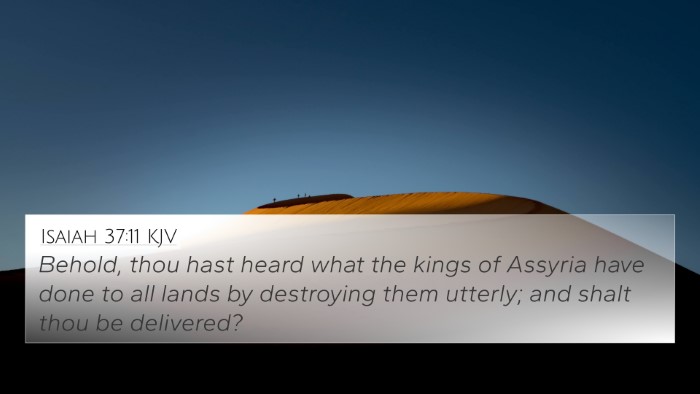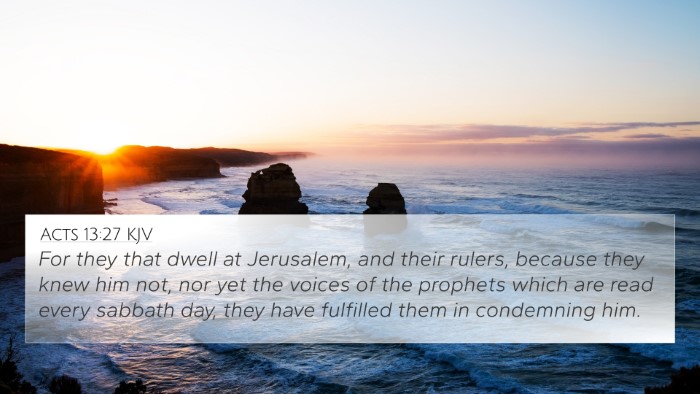Understanding Isaiah 10:7
In Isaiah 10:7, the prophet Isaiah articulates the motives of the Assyrian king, emphasizing the intent behind his actions. This verse reveals a deeper message regarding divine sovereignty and human intentions.
Verse Analysis
Isaiah 10:7 states: "But this is not what he intends, this is not what he has in mind; his purpose is to destroy and to annihilate nations not a few." This verse illustrates the Assyrian king's ambitions and how they diverge significantly from God's plan.
Commentary Insights
- Matthew Henry: Henry emphasizes that the Assyrian's intentions are misguided and that he does not recognize he is merely a tool in God's hands. His pride blinds him to the reality that his conquests serve a greater divine purpose.
- Albert Barnes: Barnes notes that while the Assyrian believes he acts independently, the sovereignty of God is at work in the background. This represents a recurring theme throughout the Bible where human plans are often subordinate to God's overarching will.
- Adam Clarke: Clarke points out the dire consequences of the Assyrian's pursuit, stating that his actions reflect a perverse ambition that leads to the downfall not only of others but eventually of himself.
Thematic Connections
This verse links significantly to themes of divine sovereignty and the moral challenges faced by nations. It is pivotal in understanding God's judgment and the role of human instruments in enacting divine will.
Cross-References
To deepen understanding, here are several key cross-references related to Isaiah 10:7:
- Isaiah 14:24-27: God declares His intentions concerning Assyria, reaffirming that His plans cannot be thwarted.
- Isaiah 37:26: Acknowledges that God has discerned the Assyrian's plans, further solidifying His control over earthly rulers.
- Proverbs 21:30: Emphasizes that human wisdom and cunning cannot stand against God's purposes, echoing the plight of the Assyrians.
- Job 12:16: Discusses the wisdom and might that belong to God, aligning with the notion that rulers act under His guidance.
- Romans 8:28: Illustrates that all things work together for good for those who love God, showing a parallel in God’s oversight of earthly events.
- Psalms 33:10-11: Affirming that the plans of nations may be foiled by God's will, which aligns aesthetically with Isaiah's message.
- Jeremiah 18:7-10: Details God's authority to shape the destinies of nations based on their actions and intentions, reinforcing the opening of Isaiah’s message.
Application
When studying Isaiah 10:7 in context, consider how it serves as a reminder to recognize God's ultimate authority in world events. It encourages believers to trust that even when human actions appear autonomous, they fit into a divine plan.
Tools for Cross-Referencing
Utilizing tools for Bible cross-referencing can enhance your understanding:
- Bible Concordance: A useful tool for locating specific words and themes within scripture.
- Bible Cross-Reference Guide: This aids in identifying verses that relate to specific scriptures or themes.
- Cross-reference Bible Study: Engaging in a study that links various verses can enrich comprehension.
- Comprehensive Bible Cross-Reference Materials: Guides that offer extensive connections between the texts facilitate deeper thematic exploration.
Conclusion
Isaiah 10:7 serves not only as a historical account of Assyrian ambitions but also as a profound reminder of divine intention amidst human action. Engaging with this verse through cross-reference and thematic study reveals the intricate tapestry of God's plan and the importance of recognizing His sovereignty in all circumstances. As you continue to explore, remember to delve into the rich inter-Biblical dialogue established through these connections.








